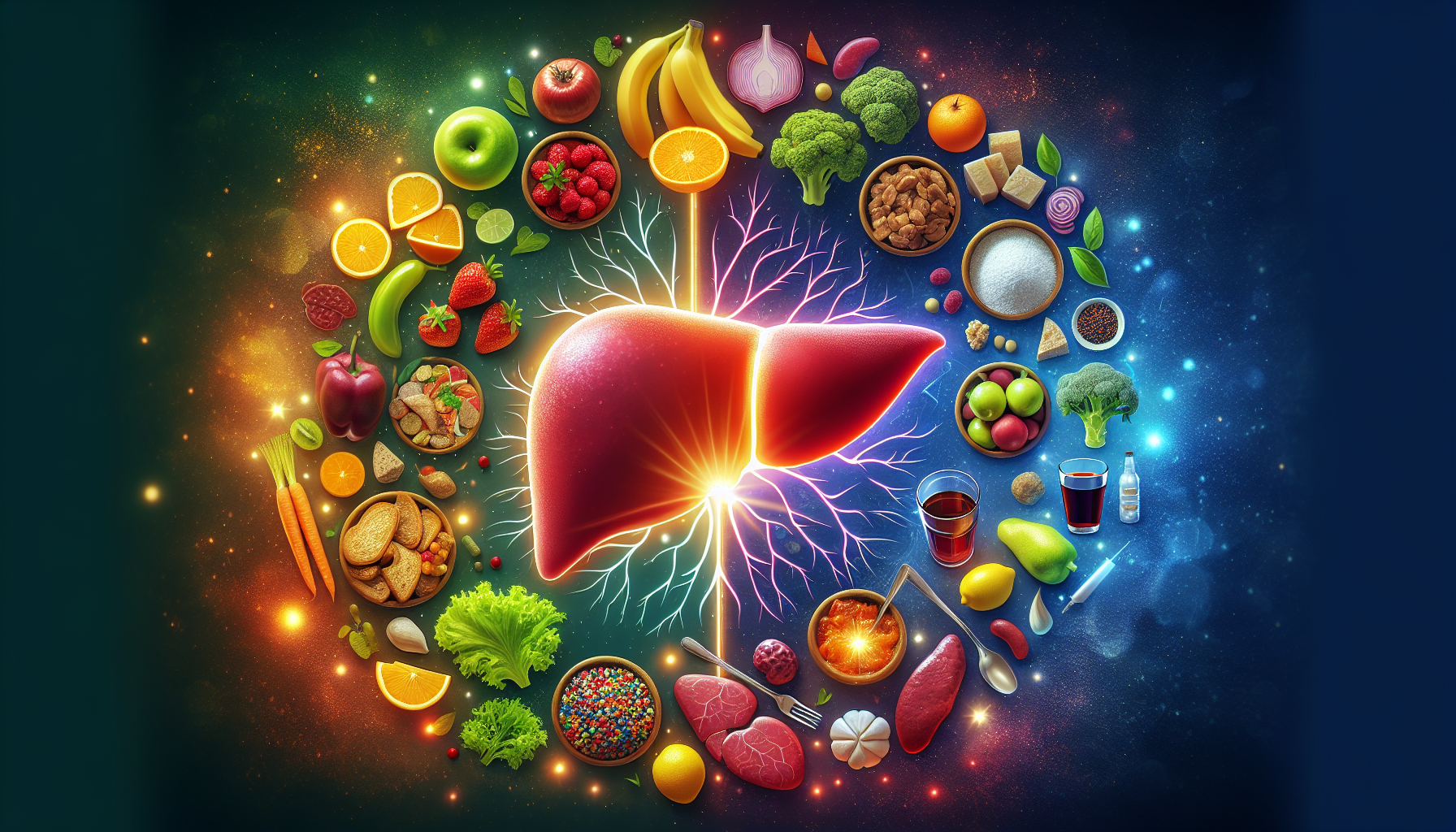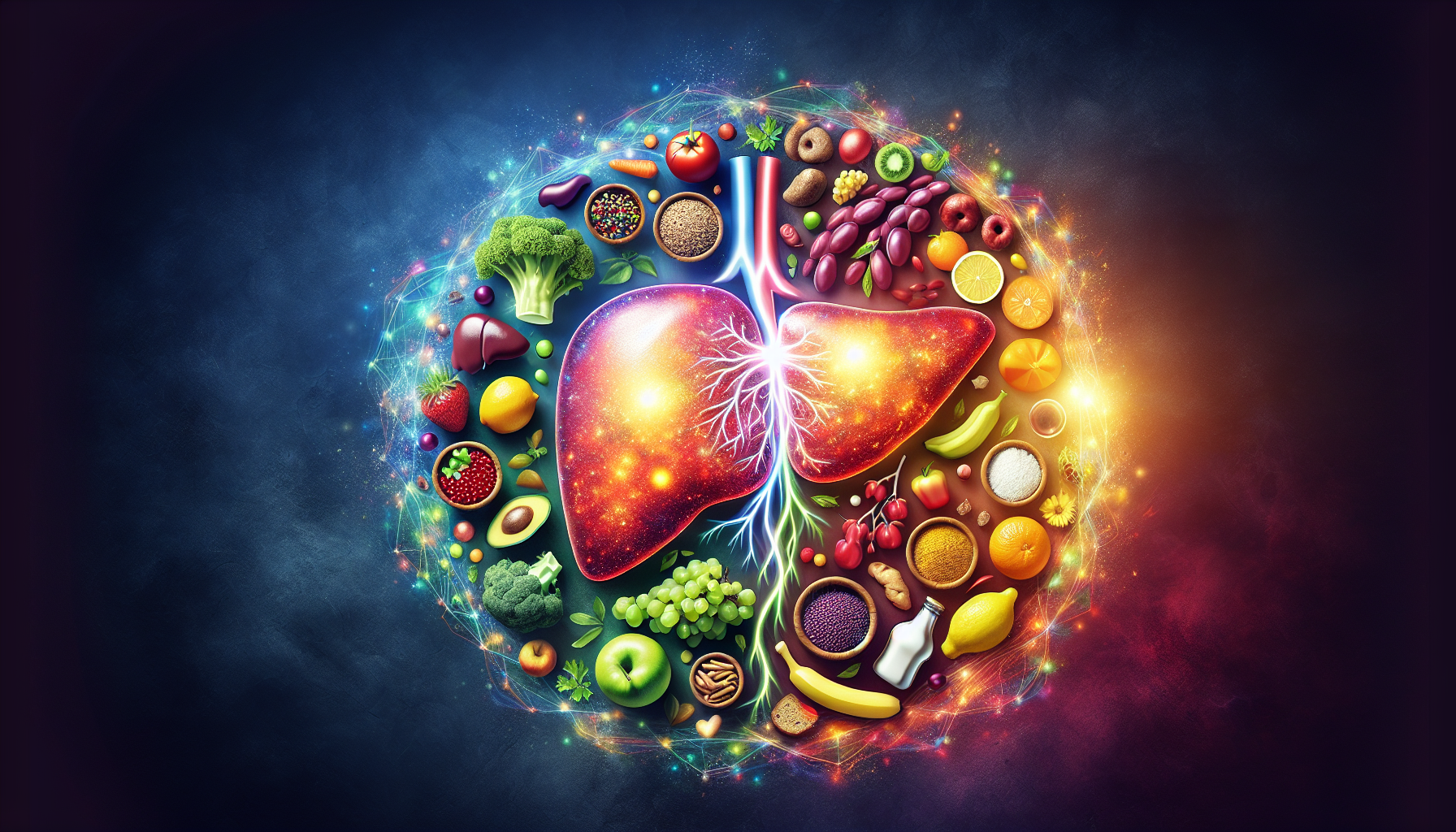In this article, we will explore the fascinating connection between diet and liver health. It is no secret that what we eat plays a crucial role in our overall well-being, and our liver is no exception. Recent scientific studies have shed light on the impact of different dietary choices on liver health, revealing intriguing findings that can help us make informed decisions about our diet. By understanding how our food choices affect our liver, we can take proactive steps towards maintaining a healthy and thriving liver. So, let’s dive into the world of nutrition and explore the optimal diet for liver health!
Discover the Ultimate Weight Loss Secrets Here!
Effects of High-Fat Diet
A high-fat diet can have detrimental effects on liver health, increasing the risk of developing Non-Alcoholic Fatty Liver Disease (NAFLD). NAFLD is characterized by the accumulation of fat in the liver, which can lead to inflammation and liver damage. Studies have shown that a diet high in saturated fats and cholesterol can promote the development of NAFLD and its progression to more severe conditions such as liver fibrosis and cirrhosis (1). Therefore, it is crucial to limit the consumption of foods high in unhealthy fats to maintain a healthy liver.
In addition to promoting the development of NAFLD, a high-fat diet can also induce inflammation and oxidative stress in the liver. This can lead to the release of pro-inflammatory cytokines and the production of reactive oxygen species, both of which can damage liver cells and impair liver function (2). The inflammatory response triggered by a high-fat diet can further increase the risk of developing liver-related complications, including liver cancer (3). Therefore, it is essential to pay attention to the types and quantities of fats consumed to protect liver health.
Importance of Balanced Nutrition
A balanced nutrition is vital for maintaining optimal liver health. Macronutrients such as proteins, carbohydrates, and fats play crucial roles in providing energy and supporting various liver functions. Proteins are essential for the synthesis of enzymes, hormones, and antibodies, which are all important for the liver’s proper functioning. Carbohydrates provide a readily available source of energy for liver cells, while fats are necessary for the absorption of fat-soluble vitamins. Micronutrients, including vitamins and minerals, are equally important for liver health as they play essential roles in various metabolic processes (4).
Fiber intake also plays a significant role in liver health. A diet rich in fiber can help regulate blood sugar levels, promote regular bowel movements, and assist in the removal of toxins from the body. Furthermore, dietary fiber has been shown to reduce the risk of NAFLD by improving insulin sensitivity and reducing inflammation (5). Including a variety of fruits, vegetables, whole grains, and legumes in your diet can help ensure an adequate intake of macronutrients, micronutrients, and fiber, thus promoting a healthy liver.

Click Here for Proven Fat-Burning Strategies!
Influence of Excessive Alcohol Consumption
Excessive alcohol consumption can have severe detrimental effects on liver health. Alcohol is primarily metabolized in the liver, and chronic alcohol abuse can lead to the development of alcoholic liver disease. Alcoholic hepatitis is a condition characterized by inflammation and liver cell damage resulting from excessive alcohol consumption. It can manifest as jaundice, abdominal pain, and liver enlargement. If not addressed, it can progress to more severe conditions such as cirrhosis (6).
Cirrhosis is a late-stage liver disease characterized by the replacement of healthy liver tissue with scar tissue. It can lead to a myriad of complications, including liver failure and portal hypertension. Prolonged and excessive alcohol consumption is the leading cause of cirrhosis worldwide (7). Furthermore, the risk of developing hepatocellular carcinoma, the most common type of liver cancer, is significantly increased in individuals with long-term alcohol use disorder (8). To protect your liver, it is essential to consume alcoholic beverages in moderation or avoid them altogether.
Benefits of Plant-Based Diets
Adopting a plant-based diet has been shown to have numerous benefits for liver health. Studies have found that individuals following plant-based diets have a reduced risk of developing NAFLD compared to those consuming a typical Western diet high in animal products (9). Plant-based diets are typically rich in antioxidants and anti-inflammatory compounds, which can help protect the liver from oxidative stress and inflammation (10). Additionally, plant-based diets have been associated with improved liver enzyme levels, indicating enhanced liver function (11). Thus, incorporating more plant-based foods into your diet can promote a healthy liver.
Unlock Your Path to a Healthier You!
Role of Sugar and Added Sugars
Excessive sugar consumption, particularly in the form of added sugars, can contribute to the development of NAFLD. Added sugars, such as high-fructose corn syrup, can increase the liver’s fat production and induce insulin resistance, both of which are risk factors for NAFLD (12). Moreover, excessive consumption of sugar-sweetened beverages has been associated with an increased likelihood of NAFLD development (13). It is important to limit the intake of added sugars and opt for natural sources of sweetness, such as fruits, to maintain a healthy liver.
Insulin resistance, which is closely linked to excessive sugar consumption, can further contribute to liver damage. Insulin resistance impairs the liver’s ability to regulate blood sugar levels, leading to higher insulin production and increased fat deposition in the liver. This can eventually lead to the development of NAFLD (14). Therefore, reducing sugar intake and maintaining stable blood sugar levels are crucial for liver health.
Fructose, a type of sugar commonly found in fruits and added to processed foods, can have a negative impact on the liver when consumed in excessive amounts. Research has shown that high fructose intake can promote liver inflammation and contribute to the development of fatty liver disease (15). It is important to consume fructose in moderation and obtain it from whole fruits rather than processed sources to minimize the risk to liver health.

Impact of Protein Consumption
Protein is an essential nutrient for liver health, as it supports various liver functions, including the synthesis of enzymes and the detoxification of harmful substances. However, the quality and quantity of protein intake can significantly impact liver health.
Consuming adequate amounts of high-quality protein is crucial for maintaining liver health. High-quality proteins, such as those found in lean meats, poultry, fish, eggs, and dairy products, provide the essential amino acids needed for optimal liver function (16). Conversely, chronic protein deficiency can impair liver function and contribute to the development of liver diseases (17).
On the other hand, excessive protein intake, especially from animal sources, can also be detrimental to the liver. Studies have shown that a high-protein diet can lead to the production of ammonia and other toxic metabolites in the liver, which can damage liver cells (18). Additionally, a diet high in animal protein has been linked to an increased risk of NAFLD (19). Therefore, it is important to strike a balance and obtain protein from a variety of sources, including plant-based options such as legumes, tofu, and quinoa.
Role of Omega-3 Fatty Acids
Omega-3 fatty acids, found primarily in fatty fish, walnuts, flaxseeds, and chia seeds, have been found to have protective effects on liver health. These fatty acids have anti-inflammatory properties and can help reduce liver inflammation and damage (20). Furthermore, omega-3 fatty acids have been shown to improve liver enzyme levels, indicating enhanced liver function (21). Adding sources of omega-3 fatty acids to your diet, such as fatty fish or incorporating flaxseeds, can be beneficial for liver health.
Discussion on Dietary Supplements
Several dietary supplements have been studied for their potential benefits on liver health. Milk thistle, a herbal supplement derived from the milk thistle plant, has been shown to have hepatoprotective effects, protecting liver cells from damage (22). Green tea extract is another supplement that has demonstrated potential protective effects on the liver by reducing oxidative stress and inflammation (23). Vitamin E, a powerful antioxidant, has been suggested to have beneficial effects on liver health, particularly in individuals with liver diseases such as NAFLD (24). However, it is important to consult with a healthcare professional before starting any dietary supplements to ensure safety and efficacy.

The Gut-Liver Axis
The gut-liver axis refers to the bidirectional communication between the gut and the liver, which plays a crucial role in maintaining overall liver health. The gut microbiome, composed of trillions of bacteria living in our digestive system, influences various aspects of liver health through metabolites and immune responses.
Research has shown that alterations in the gut microbiota composition can contribute to the development of NAFLD (25). Disruptions in gut microbial diversity and the overgrowth of harmful bacteria can lead to increased production of pro-inflammatory molecules and endotoxins, which can promote liver inflammation and damage (26).
Probiotics, beneficial bacteria that can be consumed through certain foods or supplements, have been studied for their potential to improve liver health. Probiotics can help restore a healthy gut microbiome and reduce liver inflammation (27). Including probiotic-rich foods such as yogurt, kimchi, and sauerkraut in your diet or taking probiotic supplements may offer benefits for liver health.
Impact of Processed and Fried Foods
Processed and fried foods are often high in unhealthy fats, sodium, and additives, making them detrimental to liver health. Trans fats, found in many processed and fried foods, have been shown to increase the risk of liver damage and NAFLD (28). These fats can contribute to inflammation in the liver and promote the development of liver fibrosis and cirrhosis.
Another concern with processed foods is the formation of acrylamide and advanced glycation end products (AGEs) during cooking processes. Acrylamide is a chemical compound that forms when foods, particularly starchy foods, are fried or baked at high temperatures. Studies have shown that acrylamide can have toxic effects on the liver, including oxidative stress and inflammation (29). AGEs are compounds formed when foods are cooked at high temperatures, and they have been linked to liver damage and an increased risk of NAFLD (30).
The inflammatory effects of processed foods are also notable. High consumption of processed foods, such as fast food and snacks, has been associated with increased levels of inflammatory markers and an elevated risk of liver diseases (31). Therefore, it is important to limit the intake of processed and fried foods to protect liver health.
In conclusion, diet plays a crucial role in liver health. A high-fat diet, excessive alcohol consumption, and consumption of processed and fried foods can all have detrimental effects on the liver. On the other hand, adopting a balanced diet with an emphasis on plant-based foods, limiting added sugars, and paying attention to protein and omega-3 fatty acid intake can promote a healthy liver. Additionally, the gut-liver axis and the use of dietary supplements, such as milk thistle and green tea extract, have shown potential benefits for liver health. By making informed dietary choices and prioritizing liver health, you can protect this vital organ and maintain overall well-being.

